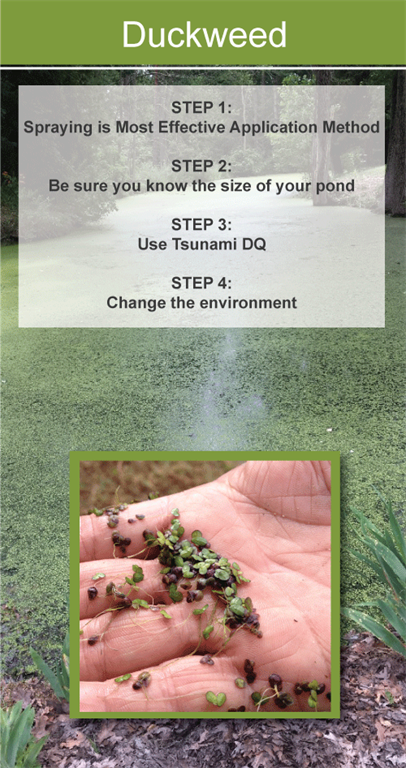Duckweed has been a common topic in our office the past couple of weeks. We have had many pond owners call wanting to know what pond herbicide to use to get rid of duckweed. However, pond owners are asking the wrong question! While a pond herbicide is what you want to use to get rid of duckweed; this is only a temporary fix. Pond owners should be asking what can I do to help slow down and prevent duckweed from taking over my pond. We can’t stress enough to pond owners that duckweed is a tough weed to control, and you need to have all your “Ducks” in a row before you try to tackle this pond weed. Here are some tips to get control your pond duckweed and tips to help prevent duckweed.
Step 1- Be sure you have properly identified the growth in your pond. Duckweed is often misidentified.
Step 2- Be sure you know the size of your pond.
Step 3- Use the pond herbicide Tsunami DQ to get existing duckweed under control. Follow these specific steps to ensure you are applying the product appropriately. Failure to follow these instructions will result in wasted time and money. You will have to use the maximum recommended dosage of Tsunami DQ, which is 2 gallons of product per acre. Depending on how severe the growth is you will need to repeat this application weekly until the growth is under control. You may need to mix a little water (2-4 gallons) with the 2 gallons of product, but the water is not meant for dilution, it is just to help you get the coverage you need.
- Wait until the wind blows the duckweed to one side of the pond
- Spray ALL the growth at once with the maximum dosage
- Repeat in 1 week if there is still bright green growth
*Yes, you have to spray the product. This pond herbicide is a contact herbicide. The product has to make contact with the growth in order to kill it.

Step 4- Ask yourself the following questions:
- Is my pond very still with little surface movement?
- Does my pond have leaf debris and/or excessive muck?
- Do livestock have access to the pond?
- Do I have fertilizer run-off?
If you answered yes to any of the questions above, you need to invest in a way to change that answer to NO!
Is my pond very still? | Get the water moving-Fountain, Aerator, clear trees to allow wind to move the surface of your pond. |
Does my pond have leaf debris or excessive muck? | Get an aerator and start adding high doses of beneficial bacteria to reduce muck levels. |
Do livestock have access to the pond? | Limit their access. Their feces is a rich fertilizer feeding the growth. |
Do I have fertilizer run-off? | Keep 20 feet around the pond that you do not fertilize the grass. Allow grass to grow higher around the pond to help filter run-off. Limit livestock access to the pond. |
Changing the environment in which duckweed thrives is one of the best ways to slow down the growth. This will give your pond herbicide a fighting chance to do what it needs to do, get rid of existing growth. If you choose to just use a pond herbicide to address your duckweed problems; you will be fighting an up-hill battle.
For additional information on using a pond herbicide or duckweed contact the experts at Sanco.
